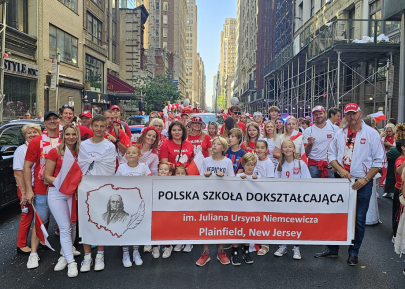POLSKA SZKOLA DOKSZTALCAJACA

POLISH CULTURAL SCHOOL
On Mondays during the school year from 5:30Pm to 8:00PM classes are held for Polish children ages 3 and up. Polish children are being taught the Polish language and culture. Children who attend the classes already speak Polish, but the school helps them to improve the language of their parents.
Szkoła Polska Dokształcająca
Zajęcia w Polskiej Szkole działającej przy naszej Parafii odbywają się
w każdy poniedziałek w okresie roku szkolnego
od godz. 5:30 do 8:00PM.
Kontakt: polskaszkolaplainfield@outlook.com
Dyrektorka Szkoły: Beata Benewiat
Tel. 732-266-4310
